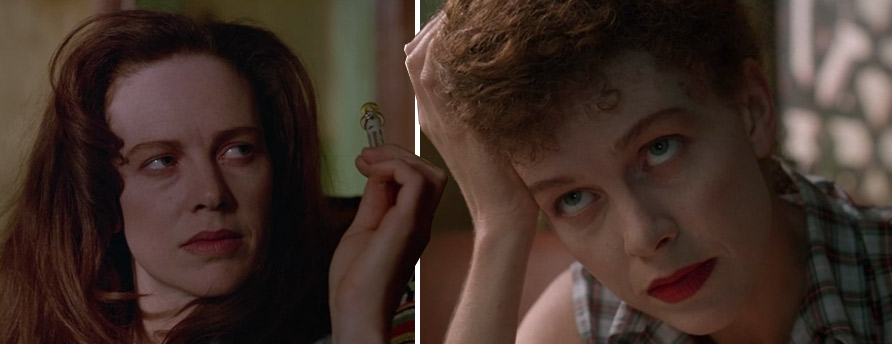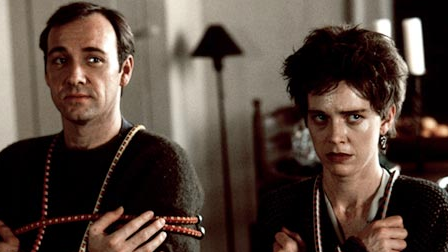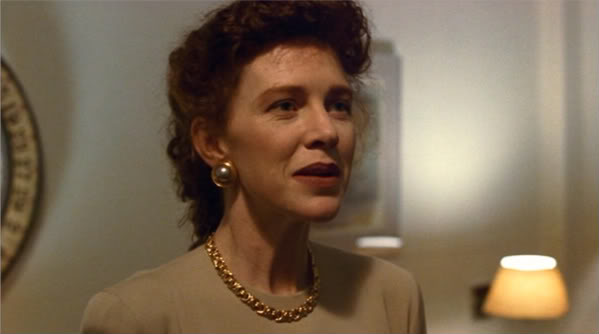Craig here, from Dark Eye Socket, with Take Three. Today: Judy Davis
 Judy Davis as "Joan Lee" and Judy Davis as "Joan Frost" in NAKED LUNCH
Judy Davis as "Joan Lee" and Judy Davis as "Joan Frost" in NAKED LUNCH
Take One: Naked Lunch (1991)
The early nineties were extra literary times for Davis. She appeared in an adaptation of E.M. Forster’s Where Angels Fear to Tread, played novelist George Sand in Impromptu, supported John Mahoney’s Faulkner-esque Southern writer in Barton Fink and performed dual role duties in David Cronenberg’s controversial adaptation of William Burroughs’ Naked Lunch. Initially, as Joan Lee, she instigates a curious urgency within Peter Weller’s Burroughs avatar William Lee. She gets a “very literary high – a Kafka high” in a 1950s NY flophouse by injecting bug powder into her right boob. As you do. Then, as Joan Frost, the wife of eloping novelist Ian Holm, she flits and flirts around a North African port town, futilely arousing Weller to stray from his budding homosexual leanings.
Davis’ roles could be entirely different entities or the very same woman or some weirdly unfeasible concoction of both. The sarcastic boredom she expresses as junk-plugged Joan #1 couldn’t be further from the deliciously fruity joie de vivre she exudes as Joan #2; the ever-present look on this Joan’s face suggests she’s either just remembered or recently repeated a particularly saucy joke -- maybe the kind of thing she feverishly typed in Arabic on her bug-morphed, Burroughs-voiced typewrite? She's all darting eyes and red-lipped pouting under falsely prim attire. Davis lets slip enough sly telling hints that she knows who she is and isn’t playing: do we want one Joan or two? she’s inferring. Whether she’s fingering a fleshy writing implement, re-enacting her doomed part in one of two “William Tell routines” or taking notes on some Interzone agents “feeding” from a mass of strung-up jism-dispensing mugwumps (as you do), Davis yields exemplary acting and exterminates all rational thought.

Take Two: The Ref (1994)
Her comic work doesn’t always get the acclaim it deserves but when she broadens her comic scope even slightly, it’s a treat. Davis does fierce comic exasperation well in numerous comedies but in The Ref – or to give it its far more obvious UK title, Hostile Hostages – it comes out in sharp, dry, staggered doses. As Caroline Chasseur, wife, mother, adulteress, fan of traditional Scandinavian Xmas food, untapped creative soul and kidnapee, she's having the best worst Christmas ever. It’s the first and last of those designations, however, that come under closest scrutiny via irked hubbie Lloyd’s (Kevin Spacey) irritability and desperate Denis Leary’s criminal intervention.
In terms of grim festive laughs The Ref sits somewhere between Trapped in Paradise and Bad Santa. The beacon role is ex-con Leary’s ex-con, but Davis (scene)steals the film, particularly when she’s pontificating on historical cooking methods beneath a candle-wreath dinner crown. There’s a palpably maniacal undertow to Caroline that rears its head from time to time. Davis has an innate gift and aim with spiteful dialogue; she almost gargles her lines before ejecting them spouse-ward. She and Spacey are the most insufferable bickering double-act but your sympathies ultimately lie with Davis as the family's outsider. The unruly yuletide intrusion ordeal leads the couple to see the errors within their marriage, of course, and it reignites their love. But Davis gives a playfully caustic turn in getting to that traditional destination.

Take Three: Husbands & Wives (1992)
Davis’ Sally in Allen’s Husbands and Wives has a lot of supporters out there, and rightly so. Many thought she was a shoo-in to win the 1992 Supporting Actress Oscar. But, alas, not. (It went, of course, to Marisa Tomei, also deserving.) But she will forever have her performance etched on celluloid as evidence enough of her place in the annals of acting. Either way, she was singled out from the excellent ensemble for lone nomination honours. Over the course of the film’s 108 minutes Davis courses through a hysterical gamut of frayed emotions and moods: spiky, insolent, fragile, torn, flappable and defiant. Sometimes the moods blur into one and sometimes they evolve into baffling permutations by the time she's passed from one side of the frame to the other. If her performance is anything else, it's breathless. This is kamikaze actressing on a grand scale.
She’s wholly good, retaining an exemplary grip on the material at all times, but two scenes stand out: her non-date with Paul (Timothy Jerome) and her discovery in flagrante delicto by husband Jack (Sydney Pollack). She’s the epitome of distanced and distressed, impolitely not-quite-there and obliviously or perhaps deliberately, slapdash (she so spilt the drink on purpose to make a beeline for the phone). Sally is not outwardly attuned enough to register as significant anything outside of what's going on inside her perceptive/paranoid, frazzled mind. But she conveys all of this with heart-wrenching hilariousness and with innumerable perceptive qualities recognisable to anyone with a firsthand knowledge of relationship entanglements. Particularly memorable is this miniature conversational coup de grâce: “Don’t defend your sex! It’s true...” [The award for best dramatically pregnant pause of 1992 goes to...] “You’re great until you start to show your age... and then they want a newer model!”
Three more key films for the taking: My Brilliant Career (1979), A Passage to India (1984), The New Age (1994)